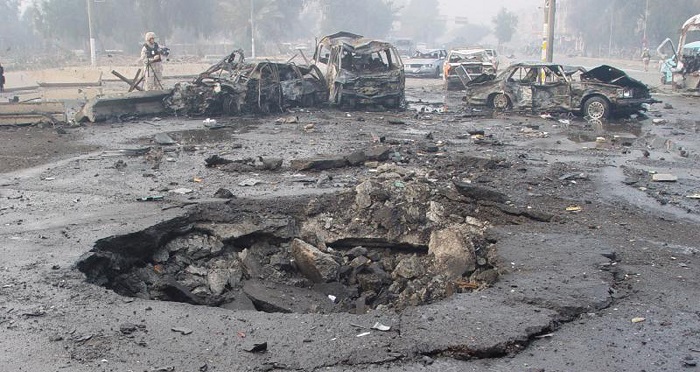I’ve always had this odd fascination with street gangs.
A mentality utterly alien to my own drives gang members. I don’t understand it. In many ways it repels me. But I find I can’t look away. As a result, I can sit and watch episode after episode of the TV documentary series Gangland.
You can’t watch the show for long before certain patterns become clear. It doesn’t matter what brand of street gang the episode highlights – biker, black, Hispanic, Asian, Native American – regardless, every one of them gets locked into a never-ending cycle of violence.
Gang A kills somebody in gang B. Gang B retaliates and kills somebody in gang A. Members of gang A mobilize and take revenge by killing somebody in Gang B. Gang B coordinates an attack and kills somebody in gang A to get even. And on and on it goes.
Both sides justify the violence and assert its necessity based on the actions of the other side. “We have to get them because they got us.”
When you listen to the interviews, nobody can even really tell you what kicked off the cycle. And ultimately, it doesn’t matter.
The U.S. and more broadly speaking, the west, have become trapped in just such a cycle.
This will enrage many Americans, but the ugly truth is U.S. foreign policy contributed to the massacre in Paris on Nov. 13. U.S. policy helped create ISIS. U.S. policy armed ISIS. U.S. policy tilled the fertile ground in Iraq and Syria over which ISIS operates. U.S. policy contributed to unleashing waves of refugees.
If you want to understand the evolution of ISIS, you need only look as far as the U.S. invasion of Iraq. In fact, we can walk the dog back even further. U.S. foreign policy created and armed al Qaida.
In a fascinating article published in the Nation, Lydia Wilson chronicled what she learned interviewing captured ISIS fighters. This was particularly poignant, and makes this case unambiguously.
At the end of the interview with the first prisoner we ask, ‘Do you have any questions for us?’ For the first time since he came into the room he smiles—in surprise—and finally tells us what really motivated him, without any prompting. He knows there is an American in the room, and can perhaps guess, from his demeanor and his questions, that this American is ex-military, and directs his ‘question,’ in the form of an enraged statement, straight at him. ‘The Americans came,’ he said. ‘They took away Saddam, but they also took away our security. I didn’t like Saddam, we were starving then, but at least we didn’t have war. When you came here, the civil war started.'”
No, I am not justifying the attack on innocent civilians in Paris.
This bears repeating.
I am not justifying the attack on innocent civilians in Paris.
It was brutal, immoral and wrong.
But I find it difficult to understand how so many Americans can scream in indignation about the deaths of innocent French people, and yet don’t blink an eye at the deaths of innocent civilians in hospital bombings, or drone strikes, or bombing runs.
Another ugly truth: U.S. policy is responsible for the deaths of hundreds of innocent civilians in Syria. Hundreds of civilians in Pakistan. Hundreds of civilians of in Yemen. And millions in Iraq. Not terrorists. Innocent people trying to scrape by in countries torn by war who happened to be in the wrong place when a missile hit, or a bomb exploded or a trigger was pulled.
Those innocent civilians were just as innocent as the people gunned down in Paris. Their lives – just as significant.
“But Mike, that is different!”
Or as one person put it, “We’re at war. Collateral damage is inevitable.”
Maybe.
But you know what? Some people in the Middle East see U.S. and western actions as justification for their own violence.
Just like you see their actions as justification for yours.
We have locked ourselves into a perpetual cycle of violence, hatred and fear.
Too many Americans look into a mirror and find the face of ISIS staring right back at them.
Before you start screaming for more U.S. military intervention to “stop ISIS,” you would do well to stop and consider the fruit of American military adventures over the last two or three decades.
It tastes pretty sour.
In one of the first posts I read in the wake of the Paris attacks, Dan Sanchez pointed out “ISIS wrote of driving to ‘extinction’ the ‘grayzone’ between Islamic extremism and ‘the crusader coalition.’ Again, it’s all about using terrorism to ‘sharpen the contradictions’ and polarize the world.”
In other words, part of the ISIS strategy involves stoking western hatred for Muslims and using that to recruit more to their cause.
Seems to me their strategy works well for them.
Over the last few days, I’ve seen many Americans calling for the total destruction of people who hold some evil ideas.
Maybe that’s justified, but how do you destroy an idea?
It’s interesting to consider the Romans tried to stomp out Christianity through violence.
I don’t claim to have answers, but I’m pretty convinced you can’t eradicate an idea with guns and bombs.
I think we need to offer some better ideas.




